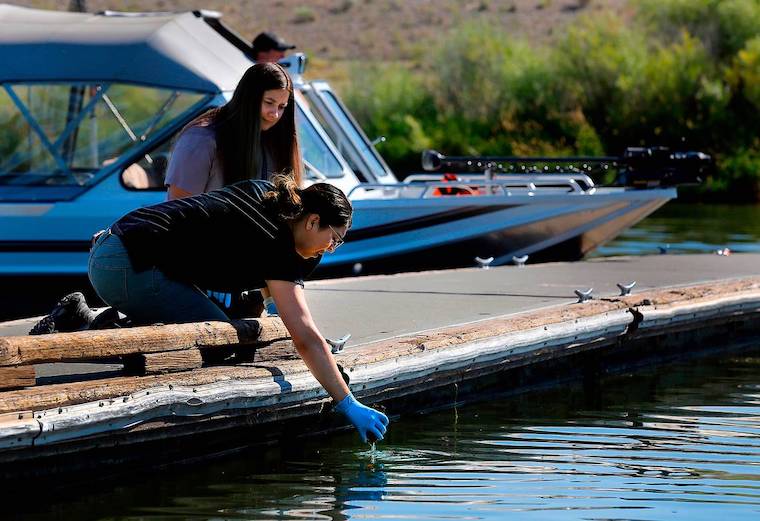forum
library
tutorial
contact

Nerve Toxin Detected in Columbia River in Tri-Cities.
Warning Issued for People and Pets
by Annette Cary
Tri-City Herald, October 14, 2022
|
the film forum library tutorial contact |

|
Nerve Toxin Detected in Columbia River in Tri-Cities.
by Annette Cary
|
More water samples will be collected on Monday from Leslie Groves Park,
Howard Amon Park and Columbia Point for testing.
 People and dogs should stay out of the Columbia River in much of Richland after toxic algae was detected in the water at Leslie Groves Park, the Benton Franklin Health District said Friday afternoon.
People and dogs should stay out of the Columbia River in much of Richland after toxic algae was detected in the water at Leslie Groves Park, the Benton Franklin Health District said Friday afternoon.
Warning signs have been posted from the Leslie Groves Park boat launch at Snyder Street to the boat launch downstream at Columbia Point.
Public health officials are placing the warnings along that entire stretch of riverfront because the toxins can move.
More water samples will be collected on Monday from Leslie Groves Park, Howard Amon Park and Columbia Point for testing.
The toxin poses a threat to people, pets and other animals that spend time in the river, drink untreated water or inhale spray from the river.
It is particularly important to keep children and pets out of the water, since they are most vulnerable to the neurotoxin contaminating the water -- Anatoxin-a, which attacks the nervous system, according to public health officials.
It's not technically algae that causes a blue or green scum on slow-moving water, but a large amount of bacteria, which produce a toxin.
In September 2021 at least three dogs died after swimming in contaminated Columbia River water in the Tri-Cities area. Toxic algae continued to be detected in the river in the Tri-Cities until mid-November.
Public health officials said it was the first time that what's commonly called toxic blue or green algae was known to be in the Columbia River in the Tri-Cities at harmful levels.
COLUMBIA RIVER DRINKING WATER
It prompted the Benton Franklin Health District to collaborate with Richland, West Richland, Kennewick and Pasco on a new program that started in July to to sample river water every two weeks near the intake at city water treatment plants and at seven recreation sites.
All four cities have Columbia River shoreline or rely on the river for at least some of their drinking water.
The contaminated water was detected through the new routine sampling program, which is designed to detect toxins before a report of an algae bloom or, as happened last year, reports of sick and dying pets.
The Tri-Cities municipal governments also have made sure they have treatment processes in place to neutralize the toxin, after the unexpected discovery of the toxins last year.
TOXIC ALGAE NEAR TRI-CITIES
In August 2022 toxic blue algae was found in the water in the Burbank area just east of the Tri-Cities, leading to the closure of areas of the McNary National Wildlife Refuge.
Repeat testing showed continued elevated levels of the algae, which is actually cyanobacteria, through the end of September in at least one of the sloughs that are popular areas for waterfowl hunters.
But this is the first time this year that toxic algae was found at harmful levels in the Columbia River in the Tri-Cities.
Symptoms can appear within 15 to 20 minutes after ingesting contaminated river water, depending on the size of the person or animal and how much water they have consumed.
TOXIN SYMPTOMS
Neurotoxin exposure in animals may result in weakness, staggering, difficulty breathing, convulsions and death. In some cases last year, dogs died before their owners could get them to a veterinarian.
In people, signs may include numbness of the lips, tingling in fingers and toes and dizziness. People who have been exposed to contaminated river water and have those symptoms should seek medical help, say public health officials.
It's far less common for people to die than for pets to die. But there was a case of a teen who died of poisoning two days after swimming in and swallowing contaminated water in a golf course pond in Wisconsin, as reported in the journal "Current Problems in Pediatric and Adolescent Health Care."
If you do swim or play in water that may be contaminated, shower with soap and water afterward.
Toxins also can accumulate in fish tissues, particularly in organs such as the liver and kidneys. If you eat fish caught in areas with a major cyanobacteria bloom, do not consume the internal organs, advise public health officials.
WATCHING FOR TOXIC WATER
People who see water in Benton and Franklin counties that could be toxic algae -- not just in the Columbia River but also the Snake and Yakima rivers -- can report it to the Benton Franklin Health District. Call 509-460-4205.
You should avoid water that looks foamy, scummy or pea green; is thick like paint; or is blue green or reddish, according to the health district.
There is no way to be sure whether the water is toxic without testing.
The Washington state Department of Ecology maintains a database of areas where algae blooms have been detected. Information is posted at nwtoxicalgae.org.
Related Pages:
Want a Family-fun Time Learning about Snake Dams and Fish? Head to RiverFest this Weekend by Editorial Board, Tri-City Herald, 10/6/22
Health Officials: Water at McNary Wildlife Refuge Still Toxic in Some Areas by Staff, Walla Walla Union-Bulletin, 9/7/22
Shock of Deadly Nerve Toxins in Columbia River at Tri-Cities Prompts New Warnings by Annette Cary, Tri-City Herald, 7/11/22
learn more on topics covered in the film
see the video
read the script
learn the songs
discussion forum
